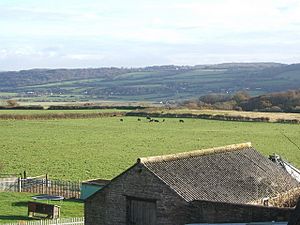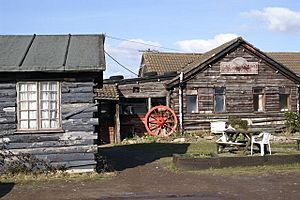Gordano Valley facts for kids
| Site of Special Scientific Interest | |
| Area of Search | Avon |
|---|---|
| Coordinates | 51°27′11″N 2°48′52″W / 51.45315°N 2.81451°W |
| Interest | Geological and Biological |
| Area | 161.68 hectares (1.6168 km2; 0.6242 sq mi) |
| Notification | 1971 |
Gordano, also known as the Gordano Valley, is a special area in North Somerset, England. It's so important for nature that it has been named a National Nature Reserve. This valley is a wonderful place to explore and learn about different plants and animals.
Contents
Discovering Gordano Valley
What's in a Name?
The name Gordano comes from Old English. It describes the valley's triangular shape. This shape stretches from Clevedon to Portishead. The name "Gorden" means "muddy valley," which fits the area well.
Exploring the Valley
The Gordano Valley runs from north-east to south-west. It sits between two ridges made of Carboniferous Limestone. One ridge follows the coast between Clevedon and Portishead. The other goes from Clevedon to Easton in Gordano.
Several villages are found in this area. These include Clapton in Gordano, Weston in Gordano, Easton in Gordano, Walton in Gordano, Portbury, and Sheepway. The M5 motorway also runs along the south side of the valley.
Water in the Valley
You might think there's a river called Gordano, but there isn't! Much of the valley is land that was once underwater. It's now just above sea level. The area is drained by special ditches called "rhynes." These rhynes help manage the water. They are now looked after by the North Somerset Internal Drainage Board.
A Special Place for Nature
Site of Special Scientific Interest
A large part of the Gordano Valley is a Site of Special Scientific Interest (SSSI). This means it's a very important place for nature. It covers about 161.68 hectares (about 400 acres). The area was first recognized as an SSSI in 1971. It's special because of its birds, insects, and geology (the study of rocks and how the Earth was formed).
Nature Reserves to Visit
Several parts of the valley are managed as nature reserves. The Avon Wildlife Trust helps protect these areas. Some of these reserves include Weston Big Wood, Clapton Moor, Weston Moor, and Walton Common. These places are great for seeing local wildlife.
Amazing Plants and Animals
The wet meadows in the valley are home to many rare plants. You can find different types of rush and thistle here. Over 130 kinds of flowering plants have been recorded. This includes three types of orchids and many grasses and sedges.
The rhynes and ditches are also full of interesting plants. Three nationally rare species grow here. These are Water Parsnip, Whorled Water Milfoil, and Fen Pondweed. The valley is also connected to the Severn Estuary through the Portbury Ashlands nature reserve. This connection helps even more wildlife thrive.
 | Mary Eliza Mahoney |
 | Susie King Taylor |
 | Ida Gray |
 | Eliza Ann Grier |



